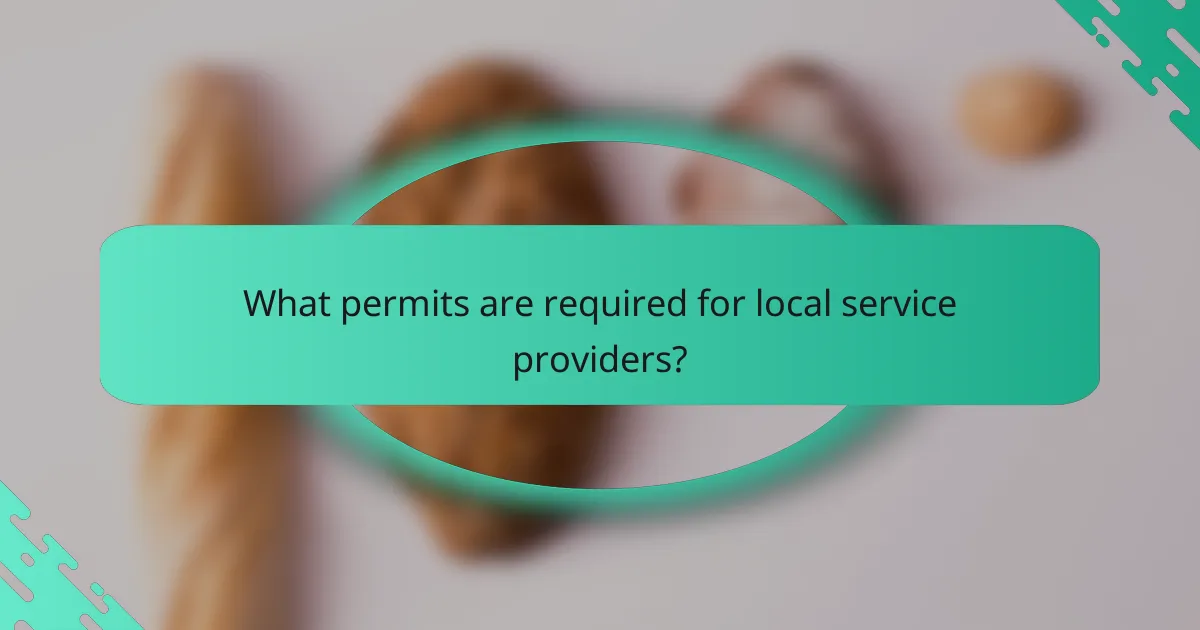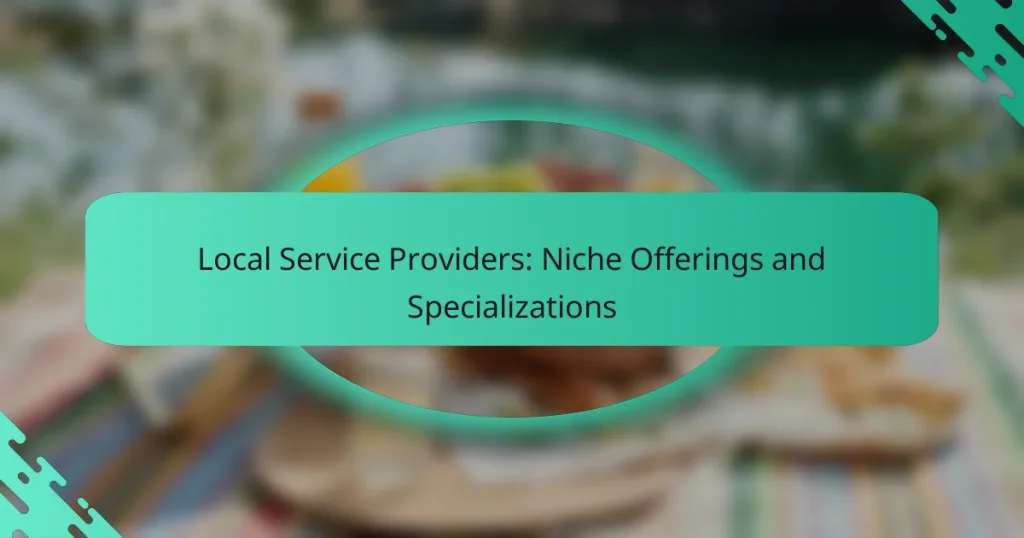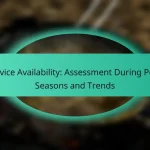Local service providers play a crucial role in urban areas by offering specialized services that cater to the unique needs of their communities. With a focus on convenience and personalized care, these providers ensure that residents receive expert assistance tailored to their specific requirements. When selecting a local provider, it’s important to consider their reputation and qualifications to ensure they can meet your expectations effectively.

What niche services do local providers offer in urban areas?
Local providers in urban areas offer a variety of niche services tailored to meet specific community needs. These services often focus on convenience, expertise, and personalized care, making them essential for urban living.
Home cleaning services
Home cleaning services in urban areas typically include standard cleaning, deep cleaning, and specialized services like carpet or window cleaning. Many providers offer flexible scheduling, allowing clients to choose one-time cleanings or regular maintenance plans.
When selecting a cleaning service, consider factors such as the types of cleaning products used, the experience of the staff, and customer reviews. Rates can vary widely, often ranging from $25 to $60 per hour, depending on the service complexity and location.
Landscaping and gardening
Landscaping and gardening services cater to urban residents looking to enhance their outdoor spaces. These services can include lawn care, garden design, and maintenance, as well as installation of features like patios or water features.
Urban dwellers should consider the size of their outdoor space and the types of plants suitable for their local climate. Many landscaping companies offer packages that can range from basic lawn care to comprehensive design services, often starting around $50 for basic maintenance.
Specialized plumbing services
Specialized plumbing services address unique issues that may arise in urban settings, such as high-rise plumbing systems or older infrastructure. Services can include drain cleaning, pipe repairs, and installation of water-efficient fixtures.
When hiring a plumber, ensure they are licensed and familiar with local building codes. Costs for plumbing services can vary, typically ranging from $100 to $300 for common repairs, depending on the complexity and urgency of the issue.
Pet grooming and care
Pet grooming and care services in urban areas provide essential support for pet owners, including grooming, walking, and daycare. Many providers offer mobile grooming options, bringing services directly to the client’s home.
Pet owners should look for groomers with good reviews and appropriate certifications. Prices for grooming can range from $30 to $100, depending on the pet’s size and the services requested.
Emergency electrical services
Emergency electrical services are crucial for urban residents facing power outages or electrical hazards. These services offer immediate assistance for issues like faulty wiring, blown fuses, or malfunctioning circuit breakers.
When seeking emergency electrical help, ensure the electrician is licensed and available 24/7. Costs for emergency services can be higher than standard rates, often starting at $150 for initial service calls, with additional charges for repairs based on the issue’s complexity.

How to choose the right local service provider?
Choosing the right local service provider involves evaluating their reputation, qualifications, and pricing. Focus on their expertise in the specific service you need, ensuring they meet your expectations and requirements.
Check online reviews and ratings
Online reviews and ratings are essential tools for assessing a local service provider’s reputation. Look for feedback on platforms like Google, Yelp, or specialized service directories to gauge customer satisfaction and service quality.
Pay attention to both the number of reviews and the overall ratings. A provider with consistently high ratings and a substantial number of reviews is generally more reliable than one with few reviews or a mixed rating profile.
Verify licenses and insurance
Confirming that a local service provider has the necessary licenses and insurance protects you from potential liabilities. Depending on the service, specific licenses may be required by local or state regulations.
Request proof of insurance to ensure that you are covered in case of accidents or damages during service. This is particularly important for contractors, electricians, and other skilled trades where risks are higher.
Request quotes and compare pricing
Requesting quotes from multiple local service providers allows you to compare pricing and services offered. Ensure that the quotes include a detailed breakdown of costs, so you understand what you are paying for.
While price is a significant factor, consider the value of the service as well. The lowest price may not always reflect the best quality, so balance cost with the provider’s reputation and qualifications when making your decision.

What are the benefits of hiring local service providers?
Hiring local service providers offers numerous advantages, including quicker access to services and a more personalized experience. These providers often understand the community’s specific needs, allowing for tailored solutions that larger companies may overlook.
Faster response times
Local service providers typically offer faster response times compared to national chains. Being in close proximity allows them to reach clients quickly, often within a few hours for urgent requests.
For example, a local plumbing service can usually arrive at your home much sooner than a larger company that may have to dispatch from a distant location. This immediacy can be crucial in emergency situations.
Personalized customer service
Personalized customer service is a hallmark of local providers. They often build relationships with their clients, leading to a better understanding of individual preferences and needs.
This familiarity can result in tailored recommendations and a more attentive service experience. For instance, a local landscaping company may remember your past projects and suggest improvements based on your specific yard conditions.
Support for the local economy
Hiring local service providers directly contributes to the local economy. When you choose a nearby business, a larger portion of your spending stays within the community, supporting local jobs and services.
Additionally, local businesses often reinvest in the community, sponsoring events or supporting local charities. This creates a positive feedback loop that benefits everyone in the area.

What are common specializations among local service providers?
Local service providers often specialize in areas that cater to specific needs within their communities. Common specializations include eco-friendly cleaning, emergency repair services, and custom landscaping designs, each offering tailored solutions for residential and commercial clients.
Eco-friendly cleaning options
Eco-friendly cleaning options focus on using environmentally safe products and methods to maintain cleanliness. These services often utilize biodegradable cleaners and sustainable practices that reduce chemical exposure and environmental impact.
When selecting an eco-friendly cleaning service, consider their certifications and the types of products they use. Look for providers that are transparent about their methods and can demonstrate a commitment to sustainability.
Emergency repair services
Emergency repair services are designed to address urgent issues such as plumbing leaks, electrical failures, or HVAC breakdowns. These providers typically offer 24/7 availability to ensure rapid response times, often within a few hours of the initial call.
When choosing an emergency repair service, verify their licensing and insurance to ensure they meet local regulations. It’s also beneficial to check customer reviews and response times to gauge their reliability during critical situations.
Custom landscaping designs
Custom landscaping designs involve creating tailored outdoor spaces that reflect the client’s preferences and the local environment. These services can include garden design, hardscaping, and the selection of native plants that thrive in the local climate.
To ensure a successful landscaping project, communicate your vision clearly and consider factors like maintenance requirements and seasonal changes. It’s advisable to request a portfolio of past projects to assess the provider’s style and expertise.

What factors influence pricing for local services?
Pricing for local services is influenced by various factors, including the complexity of the service, geographic location, and seasonal demand. Understanding these elements can help consumers make informed decisions and service providers set competitive rates.
Service complexity and duration
The complexity and duration of a service significantly impact its pricing. More intricate services that require specialized skills or longer time commitments typically come at a higher cost. For example, a simple lawn mowing may cost between $30 to $50, while landscaping design could range from $500 to $2,000 depending on the project’s scope.
When evaluating service options, consider the time required and the expertise needed. Services that involve multiple steps or specialized equipment often lead to increased labor costs, which are reflected in the final price.
Geographic location and demand
Geographic location plays a crucial role in determining service pricing, as demand can vary widely between urban and rural areas. In metropolitan regions, where demand is typically higher, prices for services like plumbing or electrical work may be elevated compared to smaller towns. For instance, a plumber in New York City may charge $150 to $300 per hour, while the same service in a rural area could cost $100 to $200 per hour.
Additionally, local competition affects pricing. In areas with numerous providers, prices may be lower due to competitive pressure. Conversely, in regions with limited options, service providers may charge a premium.
Seasonal pricing variations
Seasonal changes can lead to fluctuations in pricing for local services. For example, demand for HVAC services typically spikes during extreme weather conditions, resulting in higher prices during peak seasons. Homeowners may find that air conditioning repairs are more expensive in the summer months compared to the fall.
Service providers may also implement seasonal pricing strategies to manage demand. It’s beneficial for consumers to plan ahead and schedule services during off-peak times when prices may be lower. For instance, landscaping services might offer discounts in the winter months when demand decreases.

What permits are required for local service providers?
Local service providers typically need various permits to operate legally, which can vary by location and service type. These permits ensure compliance with local regulations and safety standards.
Types of permits
Common types of permits required for local service providers include business licenses, health permits, and zoning permits. For instance, a food service provider may need a health permit to ensure sanitary conditions, while a construction service may require zoning permits to confirm compliance with local building codes.
In some cases, specialized services like plumbing or electrical work may necessitate additional certifications or licenses specific to those trades. It’s essential to research the exact requirements based on the service offered and the local jurisdiction.
How to obtain permits
To obtain the necessary permits, local service providers should start by checking with their city or county government offices. Many jurisdictions offer online resources or application portals where providers can find detailed information about the required permits.
After identifying the permits needed, applicants typically must complete an application form, pay a fee, and sometimes provide documentation such as proof of insurance or business registration. The processing time can vary, so planning ahead is crucial.
Common pitfalls
One common pitfall is failing to obtain all necessary permits before starting operations, which can lead to fines or business shutdowns. Service providers should ensure they understand the specific requirements for their industry and locality.
Another mistake is overlooking renewal dates for permits, as many licenses require periodic renewal. Keeping a calendar or reminder system can help avoid lapses in compliance.


